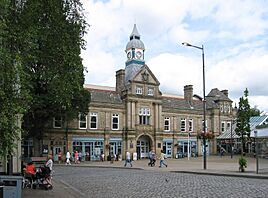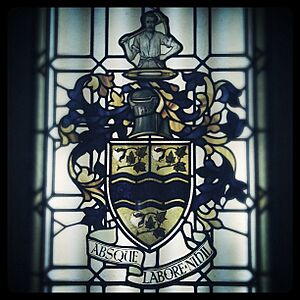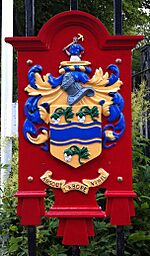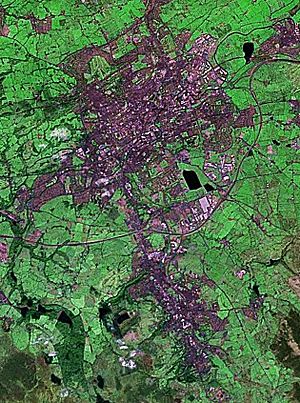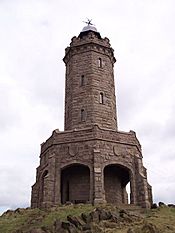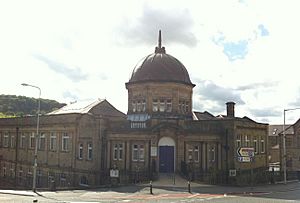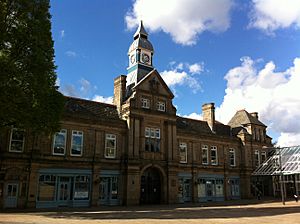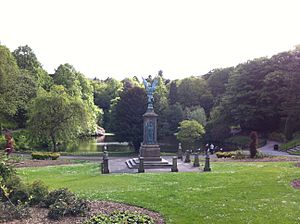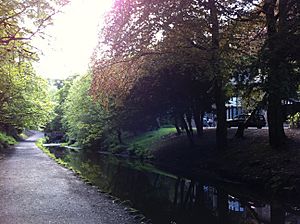Darwen facts for kids
Quick facts for kids Darwen |
|
|---|---|
|
|
| Area | 7.58 km2 (2.93 sq mi) |
| Population | 31,570 (2001 census) |
| • Density | 4,165/km2 (10,790/sq mi) |
| Demonym | Darrener |
| OS grid reference | SD695225 |
| Civil parish |
|
| Unitary authority | |
| Ceremonial county | |
| Region | |
| Country | England |
| Sovereign state | United Kingdom |
| Post town | DARWEN |
| Postcode district | BB3 |
| Dialling code | 01254 |
| Police | Lancashire |
| Fire | Lancashire |
| Ambulance | North West |
| EU Parliament | North West England |
| UK Parliament |
|
Darwen is a busy market town and civil parish in Lancashire, England. It is part of the Blackburn with Darwen area. People who live here are called "Darreners".
The A666 road goes through Darwen. It connects to Blackburn in the north and Bolton in the south. Darwen is about 18 miles (29 km) north-west of Manchester. In 2011, about 28,046 people lived in Darwen. The town has its own town council and is divided into four main areas.
The town is built around the River Darwen. This river flows from south to north. You can see it in the town's parks and near the town centre.
Contents
What's in a Name?
The name Darwen comes from an old Celtic language. Long ago, this area was part of a Celtic kingdom called Rheged. The Celtic word for oak tree was derw. This word is linked to Derewent, an old spelling for the River Darwen from 1208. Even though the area later became part of the Anglo-Saxon kingdom of Northumbria, the Celtic name for the river stayed.
A Look Back in Time

People have lived around Darwen since the early Bronze Age. This was about 4,000 years ago! You can still see parts of an ancient burial mound, called a round barrow, at Ashleigh Barrow. Inside, archaeologists found human remains and old items like a bronze dagger. You can see copies of some of these finds at the Darwen Library.
The Romans were once in Lancashire. You can even see a Roman road on maps of the area. Not much is left from Darwen in the Middle Ages. Some of the oldest buildings are farmhouses from the 1600s. Whitehall Cottage, believed to be the oldest house, has a chimney piece from 1557.
Like many towns in Lancashire, Darwen became a big centre for making textiles during the Industrial Revolution. This was a time when factories and machines changed how things were made. Samuel Crompton, who invented the spinning mule (a machine for spinning yarn), lived here. In the mid-1800s, trains and the Leeds and Liverpool Canal helped transport goods.
The most important textile factory was India Mill. It was built by Eccles Shorrock & Company. However, the company faced problems during the Lancashire Cotton Famine in the 1860s. Making cotton was a huge industry. By 1907, over 8,000 people in Darwen worked in cotton factories.
Most of Darwen was built between 1850 and 1900. You can see this in the old buildings and how they were made. Darwen was also one of the first places to use steam trams for transport.
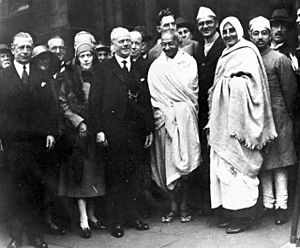
A famous businessman, Andrew Carnegie, helped pay for a public library here. The town also had colleges for art and technology.
In 1931, Mahatma Gandhi visited Darwen. He wanted to see how India's boycott of cotton goods was affecting the town.
Today, India Mill is home to many different companies. These include Brookhouse, which makes aeroplane parts, and Capita Group, which handles TV licensing. Since the 1950s, the textile industry has become much smaller. However, many old factory buildings are still used for other things.
Other important industries in Darwen include Crown Paints, which makes paint. ICI Acrylics (now Lucite International) is where acrylic glass (like Perspex) was invented. It is still made in Darwen today. Even Spitfire plane canopies were once made here! A local Heritage Centre opened in 2016.
How Darwen is Run
Darwen was its own borough for 96 years, starting in 1878. In 1974, it joined with Blackburn. The area was later renamed Blackburn with Darwen in 1997. It became a unitary authority, meaning it runs many of its own local services.
The number of people living in Darwen went down from 40,000 in 1911 to 30,000 in 1971.
Local councillors from different political parties represent Darwen. In 2009, the For Darwen Party helped create the Darwen Town Council. This council helps make decisions for the town.
Darwen has five council areas:
- Earcroft
- Marsh House
- Sudell
- Sunnyhurst
- Whitehall
Darwen used to have its own Member of Parliament. Now, it is part of the Rossendale and Darwen area.
Town Symbols
Darwen got its own coat of arms on 7 August 1878. At the bottom, it says Absque Labore Nihil in Latin. This means "Nothing without labour".
The coat of arms shows three cotton bolls. These represent the important cotton industry that helped the town grow. The three bolls also stand for the three main parts of Darwen: Over Darwen, Lower Darwen, and Hoddlesden. The River Darwen is also shown.
At the top, a man holds a pickaxe. This links to the town's motto and shows the mining that used to happen east of the town.
Learning in Darwen
After the Education Act 1870 was passed, many new schools were built in Darwen. This was to help the growing number of children get an education.
Darwen Aldridge Community Academy opened in 2008. It took over from Darwen Moorland High School. Students now learn in a modern, £49 million building.
Darwen Vale High School also got a new building. It kept its original front but was rebuilt. In 2013, the school became an academy, sponsored by the Aldridge Foundation.
In 2013, Darwen Aldridge Enterprise Studio opened. It moved into a newly renovated building on Police Street in 2014.
Crosshill School moved to the Sunnyhurst Centre in 2022. This move added more places for students at the school.
Where is Darwen?
 |
Feniscowles | Blackburn | Accrington |  |
| Leyland | Haslingden | |||
| Chorley | Bolton | Edgworth |
Darwen is in the West Pennine Moors, south of Blackburn. It sits in a valley, with the River Darwen flowing through it. The river eventually joins the River Ribble, which flows into the Irish Sea.
The A666 road follows the valley through the town centre. The weather in Darwen was perfect for cotton weaving. This is why it became one of the biggest mill towns in Lancashire.
The Guinness Book of Records says that Darwen had one of the biggest flash floods in the UK in 1848. Sadly, 12 people died.
Famous Places
Darwen Jubilee Tower
In 1897, the town council decided to build a tower to celebrate Queen Victoria's Diamond Jubilee. This was also a way to give people access to the moors. Work on the Jubilee Tower began in 1897. It officially opened in 1898.
The tower is open to the public. It stands high on the moors, about 1,227 feet (374 metres) above sea level. The tower itself is 85 feet (26 metres) tall. You can climb a spiral staircase to the top. On a clear day, you might see Blackpool Tower, the Isle of Man, North Wales, and the Furness Peninsula. In 2010, strong winds blew off the tower's dome, but it was fixed in 2012.
Darwen Library
The Darwen Library is a beautiful building. It was paid for by Andrew Carnegie, a Scottish man who became very rich in America. He gave £8,000 to help build it. The library opened on 27 May 1908.
The library has served the town ever since. Its original lecture hall became the Library Theatre in 1971. In 2017, the library and theatre became a Grade II listed building. This means it is an important historic building.
Darwen Town Hall
Darwen Town Hall opened on 11 July 1882. The clock tower was added later in 1899. In the 1920s, part of the market area became the town's bus station.
Even though many local government tasks moved to Blackburn in the 1970s, the town hall is still used. It houses offices for the Blackburn with Darwen Council and the local police. It is also where the Darwen Town Council meets.
Parks to Explore
Darwen has four lovely parks. Three are on the west side of the main road, with paths leading to the countryside and Jubilee Tower. The newest park, Ashton Park, is on the east side of Bolton Road.
Bold Venture Park
Bold Venture Park is to the west of town. It is at the bottom of the moors, near the path to Jubilee Tower. The park opened in 1889.
Sunnyhurst Wood
Sunnyhurst Wood used to be a hunting ground. It was later sold and turned into a public park on 2 July 1903. This was to celebrate the coronation of King Edward VII.
Whitehall Park
Whitehall Park is a 16-acre (6.5-hectare) park in the south of Darwen. It opened in 1879.
Getting Around Darwen
Darwen is in a large valley, with the A666 road running through it. The town is connected to the M65 at Junction 4. A lot of traffic goes through the town centre on the A666. The local council has tried to improve the road layout to help with traffic.
Darwen is on the Ribble Valley railway line. Northern trains run from Darwen railway station. You can catch trains to Blackburn and Rochdale (via Bolton and Manchester). Some trains also go to Clitheroe.
Darwen's bus station (Darwen Circus) has frequent buses to Blackburn and Accrington. There are also buses to Bolton and Clitheroe. These services are run by Blackburn Bus Company.
In 2008, there were plans to improve public transport with new bus lanes. However, these plans were stopped due to a lack of government funding.
Life in Darwen
Locals often call themselves Darreners. They are proud of their town and want it to keep its own identity, separate from Blackburn. For example, a motorway service area near Darwen was first called "Blackburn Services." After local protests, it was renamed "Blackburn with Darwen Services."
Darwen is home to the Darwen Library Theatre. The TV show Hetty Wainthropp Investigates was also filmed here.
Darwen has some fun facts in entertainment history. The town's old theatre (now gone) hosted Charlie Chaplin. The film There Was a Crooked Man, starring Norman Wisdom, was also filmed here.
The Beatles even played in Darwen on 25 January 1963! They were the main act at "The Greatest Teenage Dance."
Places of Worship
St Peter's is the main Anglican church in Darwen. It was built in 1829. Other Anglican churches include St Cuthbert's and St Barnabas'.
Darwen Methodist Church meets at Bright Street and Spring Vale.
The Medina Mosque and Islamic Centre was Darwen's first mosque. Darwen's second mosque, Faizaan e Jamal e Mustafa, opened in 2018 on Railway Road.
Music Scene
Darwen has its own music school, Darwen School of Music. It focuses mainly on popular music.
Darwen Live is a free music festival held every May. The main stage is outside the town hall. Other bands play in local pubs and bars. Famous artists like Buzzcocks and Paul Young have played here. It's also a great place for local bands to perform.
Darwen has one of the oldest brass bands in the country. It's now called Blackburn and Darwen Band. Another brass band, Darwen Brass, was formed in 2007. They have won many competitions and even qualified for the National Brass Band Championships in 2012.
Local News
You can get local news and TV from BBC North West and ITV Granada. Local radio stations include BBC Radio Lancashire and Heart North West. The Lancashire Telegraph is the local newspaper.
Sports in Darwen
Darwen was once home to Darwen Football Club. This club was formed in 1870. It was the world's first football club to have paid professional players! They reached the semi-final of the FA Cup in 1880-81. The club closed in 2009. A new club, A.F.C. Darwen, was formed almost immediately. They play at the Anchor Ground.
Darwen has a strong history in cricket. Darwen Cricket Club was founded in the late 1800s. Since 1920, they have played at Birch Hall Cricket Ground. They have won many county competitions, including the Lancashire League in 2022.
To the north-west of town is Darwen Golf Club. It was started in 1893. Because it's on the moors, it's known as a challenging course.
Darwen also has a history in karate. The North West Open Karate tournament used to be held here. Tower Shukokai Karate Club is still active in the town.
Famous People from Darwen
Many interesting people have come from Darwen:
- Neil Arthur, lead singer of the 1980s band Blancmange.
- Dick Burton, who won golf's Open Championship in 1939.
- Samuel Crompton, inventor of the Spinning Mule, lived in Darwen.
- Edward Harwood, a composer from the 1700s.
- Bryn Haworth, a singer-songwriter and guitarist.
- Alan Kendall, lead guitarist for the Bee Gees.
- Mark Patterson, a Premiership football player.
- Herbert Samuel, 1st Viscount Samuel, a Member of Parliament for Darwen and leader of the Liberal Party.
- Fergus Suter, a footballer who played for Darwen F.C. He is thought to be the world's first professional footballer.
- Kimmie Taylor, an English fighter with the Kurdish Women's Protection Units.
- Sam Wadsworth, an England international footballer and captain in the 1920s.
- James Watson, an award-winning author.
- Doreen Massey, Baroness Massey of Darwen, a member of the House of Lords and an educator.
Town Twinning
Darwen is twinned with Lamin in Gambia.
Images for kids
See also
 In Spanish: Darwen para niños
In Spanish: Darwen para niños


